This guide explores the best cheap stocks to invest in, according to analysts. We reveal undervalued equities that could outperfor...
Best Decentralized Crypto Wallets Reviewed for 2025
Last Updatedby Tony Frank · 41 mins read
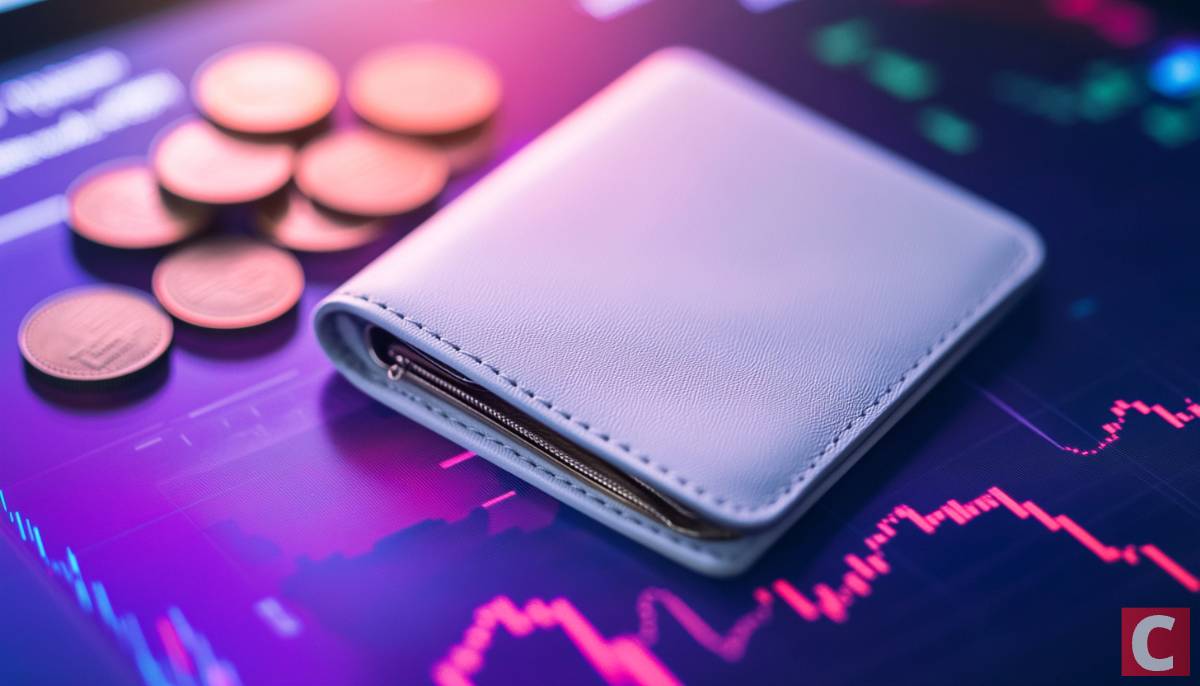
We’ve found ten decentralized wallets that stand above the rest. Keep reading to find the best decentralized crypto wallet to use today.
Disclaimer: Cryptocurrencies are considered high-risk investments. This article serves for informational purposes only. It should not be perceived as financial advice. By reading our website, you acknowledge and accept our terms and conditions. Our content may include affiliate links through which we may earn a commission.
The best decentralized crypto wallets for 2025 are Best Wallet for overall functionality, Ledger Nano X for maximum security, and Zengo Wallet for beginners. Best Wallet removes seed phrase vulnerabilities through biometric authentication while supporting 50+ blockchains with zero KYC requirements. Ledger Nano X offers premium hardware security with CC EAL5+ certification for $149, while Zengo uses institutional-grade MPC cryptography to remove seed phrase risks entirely.
We’ve tested over 50 decentralized wallets across security, features, and usability, using our methodology to identify the top 10 options for 2025. From budget-friendly hardware wallets starting at $49 to advanced software solutions with institutional-grade MPC cryptography, this article covers everything you need to store your crypto and access Web3 securely.
Key Takeaways on Decentralized Crypto Wallets
- Best Wallet tops our 2025 rankings by removing seed phrase vulnerabilities through biometric authentication across 50+ blockchains with zero KYC requirements
- Ledger Nano X offers premium hardware security with CC EAL5+ certification supporting 5,500+ cryptocurrencies, while Trezor Model One provides budget protection at $49
- MetaMask dominates Web3 with 100+ million users and supports 500,000+ tokens, making it the gateway for Ethereum-based DeFi and NFT interactions
- Cryptocurrency wallet drainer attacks stole $494 million in 2024, affecting over 300,000 wallet addresses
- Over 80% of crypto theft in 2025‘s first half occurred through infrastructure exploits targeting seed phrases and front-end compromises, totaling $2.1 billion in losses
Best Decentralized Wallets to Use in July 2025
We tried out dozens of popular crypto wallets of all types, including software wallets, hardware wallets, Bitcoin wallets, and everything in between. Based on our testing, we think these are the 10 best decentralized wallets to use today:
- Best Wallet — Overall best decentralized wallet with tons of Web3 features
- Ledger Nano X — Best cold storage wallet for maximum token security
- Zengo Wallet — Secure MPC cryptography wallet with no seed phrases
- Trust Wallet — Convenient hot wallet compatible with 100+ blockchains
- Trezor Model One — Affordable hardware wallet for BTC and popular altcoins
- MetaMask — Widely used Web3 wallet compatible with nearly all dApps
- Atomic Wallet — No KYC wallet for buying, swapping, and selling crypto
- Coinbase Wallet — Self-custody wallet with seamless Coinbase integration
- Exodus — Beginner-friendly desktop wallet with integrated exchange
- Phantom Wallet — Multi-Chain wallet optimized for Solana and Web3 dApps
Reviewing the Best Decentralized Crypto Wallets
Want to find out more about the top platforms in our list of decentralized wallets? We’ll explain what stood out about each of these wallets and why we think they’re great choices for you.
1. Best Wallet — Top Decentralized Wallet with a Range of Web3 Features
Best Wallet is our top ranked choice for 2025 because it helps address two major issues with crypto wallets: complex security setups and limited functionality. You won’t deal with seed phrases here; instead, you get biometric authentication and multi-factor security that actually works.
This non-custodial wallet supports 50+ blockchains and lets you buy crypto with just an email address. No KYC checks, no identity verification, no hassle. The built-in cross-chain swaps use Rubic’s technology to give you competitive rates across 330 DEXs and 30 bridges, so you’re not stuck with expensive exchange fees.

Best Wallet Main Page. Photo: Best Wallet
What truly sets Best Wallet apart is its seamless Web3 integration. You can stake tokens directly in the app, access early-stage crypto projects through Upcoming Tokens, and even use the iGaming hub for crypto gambling. The Best Card offers up to 8% cashback when you hold BEST tokens.
Best Wallet is suitable for you if:
- You want privacy without complications — just provide an email; no KYC required
- You’re tired of seed phrase anxiety — biometric security removes the risk of losing handwritten recovery phrases
- You need early access to new projects — Upcoming Tokens give you Stage 0 pricing before public launches
- You want everything in one app — staking, swaps, gambling, and a crypto debit card all integrated
- You trade frequently — BEST token holders get reduced fees and better rates
Best Wallet is not suitable for you if:
- You need desktop access — currently mobile-only (browser extension coming soon)
- You prefer proven track records — it’s newer than established wallets like MetaMask
- You avoid utility tokens — the best benefits require holding BEST tokens
| Feature | Details |
| Wallet Type | Mobile-only software wallet (iOS, Android) |
| KYC Required | No – just an email address needed |
| Supported Blockchains | 50+, including Bitcoin, Ethereum, Solana, Polygon, BSC |
| Security | Biometrics, 2FA, advanced cryptography, no seed phrase |
| Top Features | Cross-chain swaps, staking, iGaming hub, token launchpad, Best Card |
| Native Token | BEST (for reduced fees and exclusive benefits) |
| Price | Free |
2. Ledger Nano X — Best Cold Storage Wallet for Maximum Security
The Ledger Nano X stands out as the premium hardware wallet choice, combining bulletproof cold storage security with mobile convenience through Bluetooth connectivity. This pocket-sized device stores your private keys offline using an industry-leading CC EAL5+ certified Secure Element chip, making it immune to online attacks that plague software wallets.
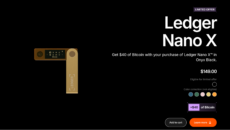
Ledger Nano X. Photo: Ledger
You can manage 5,500+ coins and tokens, including Bitcoin, Ethereum, USDT, and Solana, with the ability to install up to 100 apps simultaneously. The device connects easily to your smartphone via Bluetooth or computer via USB-C, letting you approve transactions directly on the device’s screen. Even if you lose your Ledger, your crypto stays safe. You can simply get another device and restore everything using your recovery phrase.
The Ledger Live app integrates buying, selling, swapping, and staking across multiple platforms, while the device’s built-in battery provides hours of mobile use without needing a cable connection. This makes it perfect for managing crypto on the go while maintaining maximum security standards.
Ledger Nano X is suitable for you if:
- You prioritize maximum security — CC EAL5+ certified chip and offline storage eliminate online attack vectors
- You need mobile access — Bluetooth connectivity works with both iOS and Android devices
- You hold multiple cryptocurrencies — supports 5,500+ tokens with 100 app storage capacity
- You want long-term storage — hardware wallets provide the gold standard for cold storage security
- You don’t mind the setup process — established hardware wallet with a proven track record since 2014
Ledger Nano X is not suitable for you if:
- You need frequent trading access — hardware wallets add friction to rapid transactions
- You’re budget-conscious — $149 price tag is significantly higher than software alternatives
- You prefer touchscreen interfaces — use physical buttons rather than modern touch controls
- You want instant connectivity — requires device pairing and approval for each transaction
| Feature | Details |
| Wallet Type | Hardware wallet (cold storage) |
| Connectivity | USB-C, Bluetooth (iOS and Android compatible) |
| Supported Assets | 5,500+ coins and tokens |
| Storage Capacity | Up to 100 apps simultaneously |
| Security | CC EAL5+ certified Secure Element chip, offline key storage |
| Top Features | Mobile Bluetooth access, Ledger Live integration, and staking support |
| Battery Life | Built-in rechargeable battery for mobile use |
| Price | $149 |
3. Zengo Wallet — Secure and User-friendly MPC Cryptography Wallet
Zengo revolutionizes crypto wallet security by eliminating the biggest vulnerability in traditional wallets: seed phrases. This keyless wallet uses Multi-Party Computation (MPC) cryptography — the same technology that institutions like Fireblocks and Coinbase use to secure billions of dollars. Instead of one vulnerable private key, Zengo creates two independent secret shares: one on your device and one on their servers.

Zengo Wallet Homepage. Photo: Zengo
The wallet supports 380+ cryptocurrencies and NFTs across multiple blockchains, including Bitcoin, Ethereum, Polygon, and Dogecoin. You can buy, sell, swap, and stake directly in the app, with features like inheritance planning that automatically transfer assets to designated heirs if you don’t access your wallet for a specified period.
Zengo’s 3FA recovery system uses your email, 3D facial biometrics, and an encrypted recovery file stored in your personal cloud. This means you’ll never lose access to your crypto, even if your phone gets stolen or breaks. The built-in Web3 firewall (ClearSign) protects against malicious dApps by rating transaction risks as green, yellow, or red.
Zengo Wallet is suitable for you if:
- You’re worried about losing seed phrases — MPC technology removes seed phrase vulnerability entirely
- You want institutional-grade security — same cryptography used by billion-dollar crypto institutions
- You need simple recovery options — a 3FA system with facial recognition and cloud backup makes wallet restoration easy
- You value user experience — consistently rated as having the best UI/UX in crypto
- You want built-in scam protection — ClearSign Web3 firewall warns about risky transactions and dApps
Zengo Wallet is not suitable for you if:
- You prefer full open-source wallets — MPC core is open-source, but the app itself isn’t fully transparent
- You want the cheapest trading fees — exchange fees can reach up to 4% for some transactions
- You need extensive blockchain support — supports 380+ assets but fewer chains than some competitors
- You prefer desktop access — currently mobile-only (iOS and Android)
| Feature | Details |
| Wallet Type | Mobile software wallet (iOS, Android) |
| KYC Required | No – email and facial biometric setup |
| Supported Assets | 380+ cryptocurrencies and NFTs |
| Security | MPC cryptography, 3FA recovery, no seed phrases, Web3 firewall |
| Top Features | Keyless security, inheritance planning, facial recognition, ClearSign protection |
| Recovery Method | 3FA (email + facial biometrics + cloud recovery file) |
| Price | Free |
4. Trust Wallet — Convenient Hot Wallet with Wide Compatibility
Trust Wallet is the most accessible multi-chain wallet for 2025, supporting 10+ million digital assets across 100+ blockchains. Owned by Binance since 2018, this non-custodial wallet gives you complete control over your private keys while offering one of the broadest cryptocurrency ecosystems available.
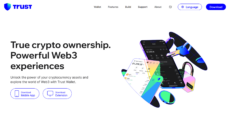
Trust Wallet Home Page. Photo: Trust Wallet
The wallet’s main feature is its built-in decentralized exchange, which allows you to swap tokens directly within the app. You can stake 24+ cryptocurrencies, earn rewards on stablecoins through the new Stablecoin Earn feature, and access thousands of dApps through the integrated Web3 browser. The SWIFT smart contract wallet feature offers advanced functionality, including biometric protection and one-click transactions.
Trust Wallet’s strength lies in its simplicity; whether you’re buying crypto with Apple Pay, participating in Launchpools for new projects, or managing NFTs, everything happens within one intuitive mobile app. The security scanner helps protect against scams, while the open-source codebase ensures transparency and community-driven improvements.
Trust Wallet is suitable for you if:
- You need extensive asset support — supports 10+ million assets across 100+ blockchains, more than almost any other wallet
- You want an all-in-one solution — built-in DEX, staking, NFT management, and dApp browser, to eliminate the need for multiple apps
- You prefer a mobile-first design — an optimized mobile experience with a browser extension also available
- You value proven reliability — 7+ years in operation with 200+ million users and a strong security track record
- You’re cost-conscious — completely free to use with only network fees for transactions
Trust Wallet is not suitable for you if:
- You need advanced security features — lacks two-factor authentication and other security measures
- You want minimal complexity — a vast feature set and millions of supported tokens can feel overwhelming
- You prefer hardware wallet security — as a hot wallet, it’s more vulnerable than cold storage solutions
- You need extensive customer support — limited support options compared to premium wallet services
| Feature | Details |
| Wallet Type | Mobile and browser software wallet (hot wallet) |
| KYC Required | No – simple setup with recovery phrase |
| Supported Assets | 10+ million assets across 100+ blockchains |
| Security | Non-custodial, recovery phrases, biometric authentication, and security scanner |
| Top Features | Built-in DEX, staking, Launchpools, NFT support, Web3 browser, SWIFT smart contracts |
| Staking Options | 24+ cryptocurrencies with competitive rewards |
| Price | Free |
5. Trezor Model One — Most Affordable Hardware Wallet
The Trezor Model One is the original and most affordable entry point into hardware wallet security, priced at just $49. Created by SatoshiLabs in 2014 as the world’s first crypto hardware wallet, this battle-tested device has secured millions of users’ assets for over a decade. Despite its budget-friendly price, it delivers enterprise-grade security with full open-source firmware that you can verify and trust.
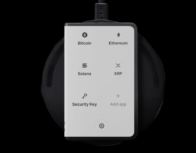
Trezor Model One. Photo: Trezor
You can manage 1,200+ cryptocurrencies through the Trezor Suite app, which handles buying, selling, trading, and portfolio tracking. The device connects via USB to computers and Android devices, requiring physical button confirmation for every transaction. Its compact design (2.4×1.2×0.2 inches) makes it perfect for secure storage or travel, while the clear OLED display ensures you can verify transaction details before approval.
Security features include PIN protection up to 50 digits, optional passphrase encryption, and tamper-evident packaging. Even if your device is lost or stolen, your 12-24 word recovery seed lets you restore everything on a new Trezor. The open-source design means the global crypto community continuously audits and improves security.
Trezor Model One is suitable for you if:
- You want proven hardware wallet security on a budget — at $49, it’s the most affordable way to get genuine cold storage protection
- You prioritize Bitcoin and major cryptocurrencies — supports 1,200+ coins, including all the most important ones
- You value open-source transparency — fully open-source firmware means no hidden vulnerabilities
- You’re new to hardware wallets — the simple two-button interface and extensive documentation make it beginner-friendly
- You need reliable long-term storage — 10+ year track record with millions of satisfied users
Trezor Model One is not suitable for you if:
- You hold newer altcoins — doesn’t support XRP, Solana, Cardano, or Monero (upgrade to Safe 5 for more coins)
- You prefer touchscreen interfaces — use physical buttons instead of modern touch controls
- You need mobile-first access — primarily designed for desktop use (Android support via USB-OTG)
- You want the latest features — newer models offer more advanced functionality and coin support
| Feature | Details |
| Wallet Type | Hardware wallet (cold storage) |
| Connectivity | USB (desktop and Android via OTG cable) |
| Supported Assets | 1,200+ cryptocurrencies |
| Display | OLED black & white screen |
| Security | Open-source firmware, PIN up to 50 digits, passphrase support |
| Top Features | Trezor Suite integration, tamper-evident packaging, 12-24 word recovery |
| Dimensions | 2.4×1.2×0.2 inches, 0.42 oz |
| Price | $49 |
6. MetaMask — Widely Used Web3 Wallet Compatible with Most dApps
MetaMask is the gateway to decentralized applications, serving over 100 million users worldwide with unmatched dApp compatibility. Developed by ConsenSys in 2016, this browser extension and mobile app serve as your key to the Ethereum ecosystem and EVM-compatible blockchains, including Polygon, Binance Smart Chain, Arbitrum, and Avalanche.
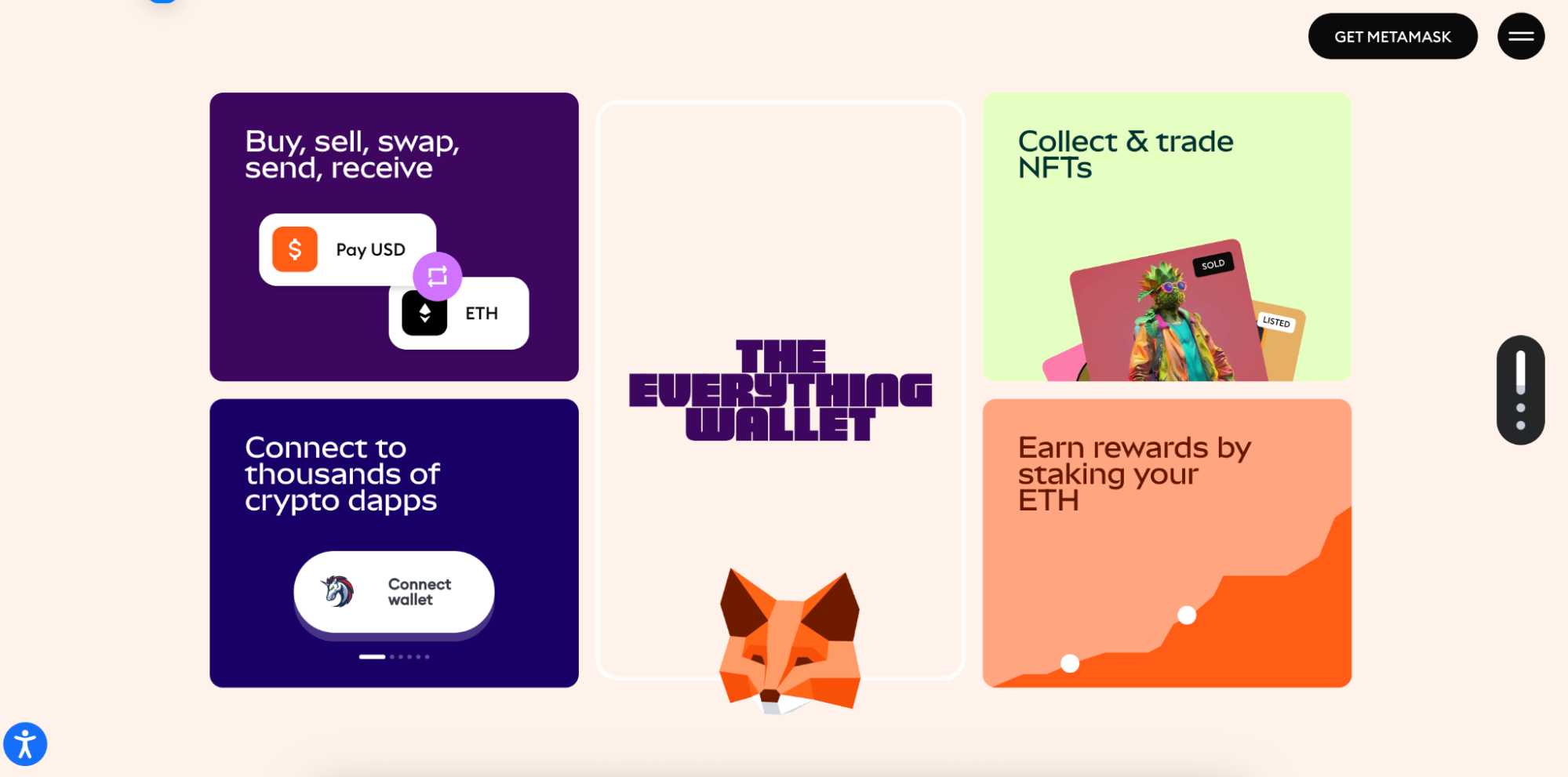
Metamask Features. Photo: Metamask
The wallet supports 500,000+ tokens and virtually every Ethereum-based dApp, from DeFi protocols like Uniswap to NFT marketplaces like OpenSea. MetaMask’s built-in swap feature aggregates prices from multiple DEXs to find you the best rates, while the staking functionality lets you earn rewards on ETH directly in the wallet. Hardware wallet integration with Trezor, Ledger, and others adds enterprise-grade security when needed.
The new MetaMask Card will let you spend crypto anywhere Mastercard is accepted, while smart contract capabilities will enable batched transactions and advanced account recovery features.
MetaMask is suitable for you if:
- You’re active in DeFi and Web3 — unmatched compatibility with virtually every Ethereum-based dApp and protocol
- You want the most battle-tested wallet — 100+ million users and 9+ years of proven reliability
- You need cross-chain flexibility — supports major EVM-compatible networks like Polygon, BSC, and Arbitrum
- You prefer open-source transparency — a fully open-source codebase with extensive security audits
- You want comprehensive features — built-in swaps, staking, NFT support, and hardware wallet integration
MetaMask is not suitable for you if:
- You hold Bitcoin or non-EVM tokens — currently limited to the Ethereum ecosystem
- You want the lowest transaction fees — swap fees can be higher than dedicated DEX platforms
- You prioritize privacy — Ethereum transactions are publicly visible and traceable
- You’re concerned about data collection — default settings may leak information to trackers
| Feature | Details |
| Wallet Type | Browser extension and mobile app (hot wallet) |
| KYC Required | No – simple setup with the recovery phrase |
| Supported Assets | 500,000+ ETH and EVM-compatible tokens |
| Security | Open-source, hardware wallet integration, security alerts |
| Top Features | Universal dApp compatibility, built-in DEX, staking, NFT gallery |
| Upcoming Features | Bitcoin support (Q3 2025), MetaMask Card |
| Price | Free |
7. Atomic Wallet — No KYC Wallet for Buying, Swapping, and Selling Crypto
Atomic Wallet provides an all-in-one crypto experience, supporting over 1,000 cryptocurrencies and tokens across 50+ blockchains without requiring KYC verification for basic features. This Estonian-based non-custodial wallet has grown to serve 10 million users worldwide since 2017, combining desktop and mobile apps with integrated buying, swapping, staking, and NFT management capabilities.
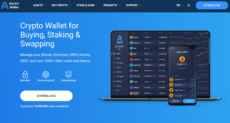
Atomic Wallet Features. Photo: Atomic Wallet
The wallet has an anonymous approach — you can buy crypto with credit cards, swap between 60+ pairs with cashback rewards, and stake popular coins like ETH, ADA, BNB, and SOL for 5-20% APR without providing any personal information. The built-in atomic swap feature and partnerships with MoonPay, Simplex, and Guardarian enable seamless fiat-to-crypto conversions in 180+ countries.
Your 12-word backup phrase and private keys are generated and encrypted locally on your device, never touching company servers. This architecture ensures that even if Atomic’s website goes offline, your funds remain secure on-chain. The wallet also features 24/7 live support and recently launched an Atomic Web3 Browser Extension in beta.
Atomic Wallet is suitable for you if:
- You value privacy and want to avoid KYC — no verification required for core wallet functions, completely anonymous usage
- You need extensive multi-coin support — 1,000+ cryptocurrencies across 50+ blockchains, including exotic tokens
- You want all-in-one functionality — integrated buying, swapping, staking, NFT storage, and a Web3 browser in one app
- You prefer competitive staking rewards — 5-20% APR on major cryptocurrencies with transparent rates
- You need responsive customer support — 24/7 live chat and email support with quick response times
Atomic Wallet is not suitable for you if:
- Security is your top priority — according to Cointelegraph, faced a $100M hack in June 2023, affecting less than 0.1% of users but raising ongoing concerns
- You want maximum transparency — closed-source software means you can’t audit the code yourself
- You prefer hardware wallet security — as a hot wallet, it’s more vulnerable to online attacks than cold storage
- You’re concerned about recent threats — malicious npm packages targeted Atomic Wallet users in March-April 2025
| Feature | Details |
| Wallet Type | Desktop and mobile software wallet (hot wallet) |
| KYC Required | No – completely anonymous for basic features |
| Supported Assets | 1,000+ cryptocurrencies across 50+ blockchains |
| Security | Non-custodial, 12-word backup, local key encryption, 2FA |
| Top Features | Anonymous crypto buying, built-in swaps with cashback, staking, and NFT support |
| Staking Rewards | 5-20% APR on ETH, ADA, BNB, SOL, TRX, and others |
| Price | Free |
8. Coinbase Wallet — Self-custody Wallet with Seamless Coinbase Integration

Coinbase Wallet page. Photo: Coinbase
Coinbase Wallet is the bridge between traditional crypto exchanges and the decentralized Web3 world, offering seamless integration with the largest US crypto exchange while maintaining full self-custody of your assets. This free wallet supports millions of coins across eight major networks, with Smart Wallet technology that removes seed phrases through passkey authentication.
The wallet’s standout feature is earning 4.7% APY on USDC holdings with monthly rewards paid directly to your wallet — no lock-ups or complex requirements. You can buy crypto using 120+ payment methods globally, swap tokens natively or through DEXs, and easily transfer funds between your Coinbase exchange and wallet accounts. The built-in dApp browser provides access to thousands of Web3 applications for DeFi, NFT trading, and gaming.
Smart Wallet technology is the future of crypto wallets, using passkeys stored on your device (Face ID, fingerprint, or hardware keys) instead of vulnerable seed phrases. This browser-based solution requires no app downloads and enables gasless transactions through sponsored fees, making on-chain interactions as simple as traditional web browsing.
Coinbase Wallet is suitable for you if:
- You’re already a Coinbase exchange user — smooth integration allows easy transfers and unified crypto management
- You want to earn passive income — 4.7% APY on USDC with monthly payouts and instant liquidity access
- You’re interested in cutting-edge wallet technology — Smart Wallet with passkey authentication eliminates seed phrase vulnerabilities
- You need extensive payment options — 120+ payment methods, including Apple Pay, Google Pay, and bank transfers
- You want comprehensive Web3 access — built-in dApp browser, NFT marketplace integration, and DeFi protocol support
Coinbase Wallet is not suitable for you if:
- You want maximum anonymity — strong integration with the regulated Coinbase exchange reduces privacy
- You prefer minimal fees — 1% fee on crypto purchases plus payment processing fees
- You need advanced security features — lacks two-factor authentication and multi-signature support
- You want extensive desktop functionality — primarily mobile and browser-focused, with limited desktop features
| Feature | Details |
| Wallet Type | Mobile app and browser extension (self-custody) |
| KYC Required | No for wallet, but KYC is needed for Coinbase exchange integration |
| Supported Assets | Millions of coins across 8 networks (Bitcoin, Ethereum, Solana, Base, etc.) |
| Security | Self-custody, Smart Wallet passkeys, dApp security scanner |
| Top Features | 4.7% USDC rewards, Coinbase integration, Smart Wallet, gasless transactions |
| Special Benefits | Zero fees on Base network, seamless exchange transfers, and NFT marketplace access |
| Price | Free (network fees and 1% purchase fees apply) |
9. Exodus — Beginner-Friendly Desktop Wallet with Integrated Exchange
Exodus is optimal for beginner-friendly crypto wallets since 2016, combining beautiful visual design with powerful functionality across desktop, mobile, and browser platforms. With 2.2+ million monthly active users, this self-custodial wallet supports 260+ cryptocurrencies across 50+ blockchain networks, making it ideal for users who want asset management without complexity.

Exodus Homepage. Photo: Exodus
The wallet features an integrated exchange with competitive 0.5% swap fees (updated in January 2025), built-in staking for major cryptocurrencies that earn 3-7% APY, and an NFT gallery for Ethereum and Solana assets.
The recent launch of XO Pay allows US users to buy and sell crypto directly within the mobile app, while the Passkeys Wallet technology eliminates seed phrases using biometric authentication and MPC security.
Exodus prioritizes user experience with its intuitive portfolio tracking, real-time price charts, and cross-device synchronization. The wallet integrates with Trezor hardware wallets for enhanced security and offers 24/7 customer support.
Exodus is suitable for you if:
- You’re new to crypto and value simplicity — an intuitive interface with visual portfolio tracking makes crypto management effortless
- You want everything in one app — integrated exchange, staking, NFT gallery, and fiat on-ramps eliminate the need for multiple platforms
- You prefer a desktop-first experience — an advanced desktop application with a full feature set and beautiful design
- You need reliable customer support — a 24/7 support team with responsive assistance via chat and email
- You want transparency and legitimacy — a publicly traded company with regular financial disclosures and a proven track record
Exodus is not suitable for you if:
- You prioritize maximum security — the closed-source desktop version raises transparency concerns for security-focused users
- You want the lowest trading fees — 0.5% swap fees are higher than direct DEX usage
- You need advanced features — lacks features like two-factor authentication and advanced security options
- You prefer open-source solutions — the desktop version is partially closed-source, unlike fully open alternatives
| Feature | Details |
| Wallet Type | Desktop, mobile, and browser extension (self-custody) |
| KYC Required | No – completely anonymous setup and usage |
| Supported Assets | 260+ cryptocurrencies across 50+ blockchain networks |
| Security | 12-word recovery phrase, local encryption, Trezor integration, MPC Passkeys |
| Top Features | Integrated exchange (0.5% fees), staking (3-7% APY), NFT gallery, XO Pay |
| Company Status | Publicly traded (NYSE: EXOD) with 2.2M+ monthly active users |
| Price | Free |
10. Phantom – Multi-Chain Wallet Optimized for Solana and Web3 dApps
Phantom was once the leading Solana wallet and slowly evolved into a powerful multi-chain solution serving over 15 million monthly active users with $25 billion in self-custody assets. Originally launched in 2021 as the “MetaMask of Solana,” Phantom now supports Bitcoin, Ethereum, Polygon, Base, and Sui, offering cross-chain functionality through its Cross-Chain Swapper that processed $29 million in monthly exchange, according to TradingView.

Phantom Wallet Features. Photo: Phantom
The wallet features an intuitive design that simplifies blockchain complexity—you can view Solana NFTs alongside Ethereum NFTs in a single, unified interface without requiring manual network switching. Built-in features include SOL staking with ~7% APY, instant token swaps with 0.85% fees, comprehensive NFT management with floor price tracking, and direct marketplace integration with Magic Eden and OpenSea for 2-click selling.
Phantom’s recent $150 million Series C funding round, led by Sequoia Capital and Paradigm, which valued the company at $3 billion, demonstrates institutional confidence in its vision of making Web3 accessible to everyone.
The wallet processes ultra-low Solana fees ($0.00025-$0.002) while maintaining enterprise-grade security through Kudelski Security audits and hardware wallet integration.
Phantom is suitable for you if:
- You’re active in the Solana ecosystem — the gold standard wallet for Solana DeFi, NFTs, and meme coins with unmatched native integration
- You want true multi-chain simplicity — manage Bitcoin, Ethereum, Solana, and other chains without switching wallets or manually adding networks
- You’re an NFT collector or trader — advanced NFT management with floor prices, collection sorting, and direct marketplace selling in 2 clicks
- You value user experience over complexity — a clean interface that makes Web3 feel as simple as traditional apps
- You need reliable cross-chain swaps — seamless bridging between chains with competitive fees and minimal slippage
Phantom is not suitable for you if:
- You primarily use Ethereum ecosystems — while it supports Ethereum, MetaMask still offers superior EVM chain extensibility
- You want the lowest possible swap fees — a 0.85% swap fee is higher than direct DEX usage, though competitive for convenience
- You need advanced staking options — currently only supports SOL staking despite multi-chain support
- You prefer maximum decentralization — some users prefer fully open-source alternatives with more transparency
| Feature | Details |
| Wallet Type | Browser extension and mobile app (self-custody) |
| KYC Required | No – private by design, no personal information required |
| Supported Assets | Solana, Bitcoin, Ethereum, Polygon, Base, Sui, and thousands of tokens |
| Security | Self-custodial, hardware wallet integration, scam detection, Kudelski Security audits |
| Top Features | Cross-chain swapper, SOL staking, NFT marketplace integration, Token Pages |
| Company Valuation | $3 billion (January 2025 Series C) |
| Price | Free (0.85% swap fees and network gas fees apply) |
Top Decentralized Crypto Wallets Compared
After reviewing the best decentralized wallets, it is now time to collect and summarize the information. We created a table of comparison that will help you see their characteristics more clearly:
| Wallet | Type | Supported Assets | KYC Required | Key Features | Best For | Price |
| Best Wallet | Mobile Software |
50+ blockchains | No (email only) | Biometric auth, no seed phrases, cross-chain swaps, staking, iGaming hub | Privacy-focused users who want all-in-one functionality | Free |
| Ledger Nano X | Hardware | 5,500+ coins/tokens | No | CC EAL5+ chip, Bluetooth, offline storage | Maximum security for long-term storage | $149 |
| Zengo Wallet | Mobile Software |
380+ cryptocurrencies | No (Email + biometrics) | MPC cryptography, no seed phrases, 3FA recovery | Users worried about losing seed phrases | Free |
| Trust Wallet | Mobile/ Browser |
10M+ assets, 100+ chains | No | Built-in DEX, staking, NFT support, Binance-owned | Multi-chain users wanting proven reliability | Free |
| Trezor Model One | Hardware | 1,200+ cryptocurrencies | No | Open-source, OLED display, physical buttons | Budget-conscious users want hardware security | $49 |
| MetaMask | Browser/ Mobile |
500K+ ETH tokens | No | Universal dApp compatibility, built-in swaps | Ethereum/DeFi enthusiasts | Free |
| Atomic Wallet | Desktop/ Mobile |
1,000+ coins, 50+ chains | No | Anonymous usage, built-in exchange, and staking | Privacy-focused multi-coin users | Free |
| Coinbase Wallet | Mobile/ Browser |
Millions of coins, 8 networks | No | 4.7% USDC rewards, Coinbase integration, Smart Wallet | Coinbase exchange users | Free |
| Exodus | Desktop/ Mobile/ Browser |
260+ cryptocurrencies | No | Good UI, integrated exchange, 24/7 support | Beginners wanting a desktop-first experience | Free |
| Phantom | Browser/ Mobile |
Multi-chain support | No | Solana-optimized, cross-chain swaps, NFT | Solana ecosystem users | Free |
How We Ranked the Best Decentralized Crypto Wallets
Our selection process for the best decentralized crypto wallets combines testing with analysis across multiple critical factors. We evaluated over 50 wallets through hands-on testing and research, using a weighted scoring system that prioritizes user safety, functionality, and real-world usability.
Security Architecture and Audit History
We evaluated each wallet’s security implementation, including encryption methods, private key management, and authentication systems. Wallets underwent assessment based on third-party security audits, open-source code availability, and track record of security incidents.
We prioritized wallets using advanced security like MPC cryptography (Zengo), hardware-grade security chips (Ledger), or biometric authentication without seed phrases (Best Wallet). Our research included reviewing security audit reports from firms like Kudelski Security and analyzing historical vulnerability disclosures.
Asset Support and Blockchain Compatibility
We assessed the breadth and depth of cryptocurrency support across different blockchain networks. This evaluation considered both the total number of supported assets and the quality of integration with major blockchains like Bitcoin, Ethereum, Solana, and emerging networks.
Wallets supporting 50+ blockchains with native integration received higher scores than those requiring manual network additions. We tested cross-chain functionality and swap capabilities to verify advertised compatibility.
User Experience and Interface Design
We conducted extensive usability testing across mobile apps, browser extensions, and desktop applications. This included evaluating setup processes, transaction flows, portfolio management features, and overall interface intuitiveness.
We tested wallets with both crypto beginners and experienced users to assess learning curves and feature accessibility. Special consideration was given to innovative UX approaches like passkey authentication and gasless transactions.
Web3 Integration and dApp Compatibility
We tested connectivity with popular decentralized applications across DeFi, NFT marketplaces, and gaming platforms. This evaluation included measuring connection speed, transaction approval processes, and compatibility with emerging Web3 protocols.
Wallets with built-in dApp browsers, integrated DEX functionality, and comprehensive NFT support scored higher. We verified compatibility with major platforms like Uniswap, OpenSea, and chain-specific applications.
Fee Structure and Cost Analysis
We analyzed transaction fees, swap costs, and any premium features to assess the overall value proposition. This included testing built-in exchange rates against direct DEX usage and evaluating hidden costs or premium tiers. Our analysis considered both network gas fees and wallet-specific charges to provide transparent cost comparisons for different user types.
What is a Decentralized Crypto Wallet?
A decentralized crypto wallet is a type of software that enables you to store cryptocurrency on your own devices without relying on a third party or centralized company for security or other services. They are also known as full self-custody wallets or non-custodial wallets, as they provide you with full control over your cryptocurrency.
What defines a decentralized wallet — as opposed to a centralized wallet — is who owns the wallet’s private keys. This is important because private keys are critical to accessing a wallet’s tokens.
With a decentralized wallet, you (the wallet owner) are in control of the wallet’s private keys. With a centralized wallet, on the other hand, you have access to the wallet, but a third party, such as a crypto exchange or broker, manages the private keys.
Centralized wallets are potentially problematic because if the exchange goes bankrupt or suffers a hack, you could potentially lose your cryptocurrency. There’s a common saying in the crypto world: “Not your keys, not your coins.”
This is what happened to account holders at FTX, the major crypto exchange that went bankrupt in 2022. Token holders had centralized crypto wallets managed by the exchange, and their funds were lost when the exchange went bankrupt.
Decentralized wallets eliminate this risk, but they do come with trade-offs. Taking responsibility for your wallet’s private keys means there’s no one to ask for help if you lose your keys. You can also send and receive crypto without oversight by a third party, which can allow you to do more in Web3 but also makes you more vulnerable to scams.
Benefits of Decentralized Bitcoin Wallets
Decentralized cryptocurrency wallets offer several benefits compared to centralized wallets, which is why they’re the most popular choice for crypto owners. Let’s dive into the benefits and explain how they work.
Total Control over Your Cryptocurrency
The biggest benefit of a decentralized crypto wallet is that you have complete control over your tokens and other digital assets, like NFTs. You can do whatever you like with your tokens — send and receive from any dApp, swap them through an exchange, stake them with a decentralized finance (DeFi) platform, and more. There’s no third-party custodian that can impose limitations on how you use your crypto.
This is especially important for making your tokens resistant to financial censorship. Not only can an exchange or similar crypto-related entity block your transactions, but neither can governments. Your tokens exist completely outside the traditional financial system.
Access to a Wider Range of Tokens
Most decentralized crypto wallets store a much wider range of tokens — from more blockchains — than most centralized wallets. That’s because centralized wallets typically only work with approved digital assets, such as the specific tokens that a crypto exchange offers for trading.
Decentralized wallets, on the other hand, support as many networks as possible to give you the greatest flexibility to explore Web3. For example, Best Wallet supports over 60 blockchains, while Trust Wallet supports more than 100.
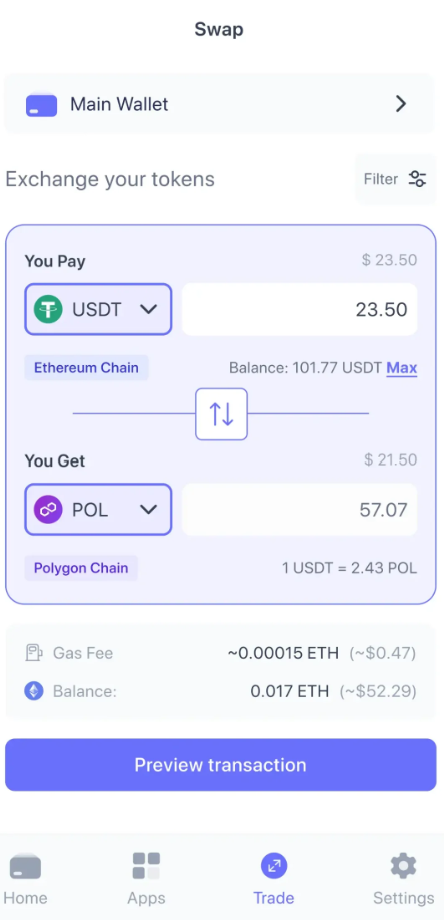
Screenshot from Best Wallet
Connectivity to Web3 and dApps
Another major benefit of decentralized wallets is that they enable you to connect to dApps across Web3. Because of this, decentralized wallets are also called DeFi wallets.
Many decentralized wallets have built-in marketplaces where users can explore dApps to connect to. Some of the most popular dApps include the decentralized crypto exchange Uniswap, the NFT marketplace OpenSea, and the DeFi platform Yearn.finance.
Decentralized apps can also connect to crypto presales, which gives investors the ability to buy emerging tokens before they launch on exchanges.
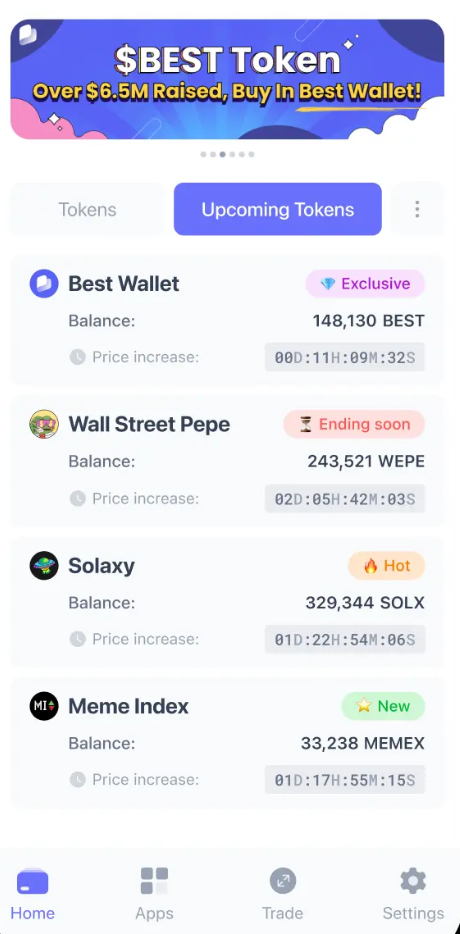
Full Anonymity
Whereas most centralized crypto wallets require KYC checks—which include ID verification and providing proof of address—most decentralized wallets do not. All you need to sign up is an email address or a username. You can buy and sell crypto completely anonymously, without sharing any sensitive personal details.
No Custodian Risk
As we discussed above, decentralized wallets also eliminate risks that stem from putting someone else in charge of your wallet’s private keys. For example, your tokens aren’t at risk of a custodian going bankrupt or suffering a hack. You must still be mindful to keep your token safe, but the risk doesn’t stem from your wallet’s custodian.
Are Decentralized Crypto Wallets Safe?
Decentralized wallets can be extremely safe. However, it’s important to understand how these wallets work and how to keep your tokens secure.
First, it’s important to choose a trusted wallet provider. If your wallet software has a flaw, it could be vulnerable to hacks even if you do everything right. This is why so many wallets open-source their code—so that security experts can look over it—or undergo third-party security audits.
It’s also important to think about what type of security systems a wallet chooses. Some offer multiple layers of security, like two-factor authentication and PIN codes. Others rely on seed phrases, which are somewhat vulnerable since they must be written down and kept safe. If you lose your wallet’s seed phrase, you won’t be able to get access to your tokens on another device.
Finally, the freedom that decentralized crypto wallets provide can be a double-edged sword if you’re not careful. Scams abound in the crypto world, and if you connect to an untrustworthy dApp you could lose tokens. You’re solely responsible for keeping your crypto wallet secure.
Tips for Improving Security When Using DeFi Wallets
It’s important to take a security-first approach when using a decentralized crypto wallet. Otherwise, you could fall prey to a scam or hack that results in a significant loss of tokens.
To help, we have five tips for how you can maximize your wallet’s security.
1. Activate Multi-factor Authentication
If your crypto wallet offers multi-factor authentication—such as SMS authentication, an authentication code from an app, fingerprint unlock, or facial recognition—be sure to activate those security measures when setting up your wallet. These measures can make it much more difficult for an attacker to get into your wallet even if they are able to steal your password.
2. Store Your Seed Phrase Offline
Many—but not all—DeFi crypto wallets use a seed phrase that represents your private key. You need the seed phrase to restore your wallet to another device if you lose your device or lose your wallet’s password.
When setting up your wallet, write down your seed phrase on a piece of paper and store it somewhere secure. Never store your seed phrase on your computer or in the cloud, where it could potentially be stolen. Don’t tell anyone where your seed phrase is located or show it to anyone.
If your wallet doesn’t use a seed phrase—Best Walle and Zengo Wallet do not—then your wallet’s recovery process typically involves your email address and a recovery file. So, be sure to keep your email secure as well.
3. Keep Your Tokens Offline
If possible, it’s a good idea to store your tokens offline in a hardware or cold storage wallet rather than a software or hot storage wallet. Hardware wallets are designed to keep your tokens disconnected from the internet and they require physical access to your wallet to approve any transactions. This makes it much more difficult for remote attackers to steal your cryptocurrency through a hack, even if they have your wallet’s password.
We’ll dive into more detail about hardware wallets and how they work later in the guide.
4. Spread Your Tokens Across Multiple Wallets
Another good security practice, especially if you have a large amount of cryptocurrency, is to split your tokens up among several different wallets. This can include a mix of software and hardware wallets.
The advantage of this approach is that in the event your wallet is hacked and tokens are stolen, you only stand to lose some of your total cryptocurrency holdings. It’s extremely unlikely that any attacker could steal coins from multiple different wallets with different passwords and different security configurations.
5. Do Your Research Before Connecting to dApps
One of the most common ways that people lose tokens when using decentralized wallets is by connecting to malicious dApps. These could be outright scams in which you send tokens to another wallet for a service that doesn’t exist, while other malicious dApps are designed to take tokens from your wallet.
The solution in either case is to carefully research any dApps before you connect to them. Make sure the dApp is legitimate, and make sure you are connecting to the correct wallet or contract address. It’s also important to only click trusted links and to double-check URLs, since lookalike links are a common technique used by scammers.
How to Pick a Decentralized Bitcoin Wallet
There’s a lot to consider when choosing the best decentralized crypto wallet. We’ll break down the things you need to look for and highlight factors that help the top wallets stand out.
Security Measures
If a decentralized wallet isn’t 100% secure, you should never use it. That said, many wallets achieve security in different ways, so it’s important to know what to look for.
To start, consider whether you want a wallet with a seed phrase or not. Seed phrases can include 12 to 24 randomly generated words and they are commonly used because they’re effective. However, you have to store your seed phrase somewhere safe, or else you could potentially lose access to your wallet forever if you lose your device.
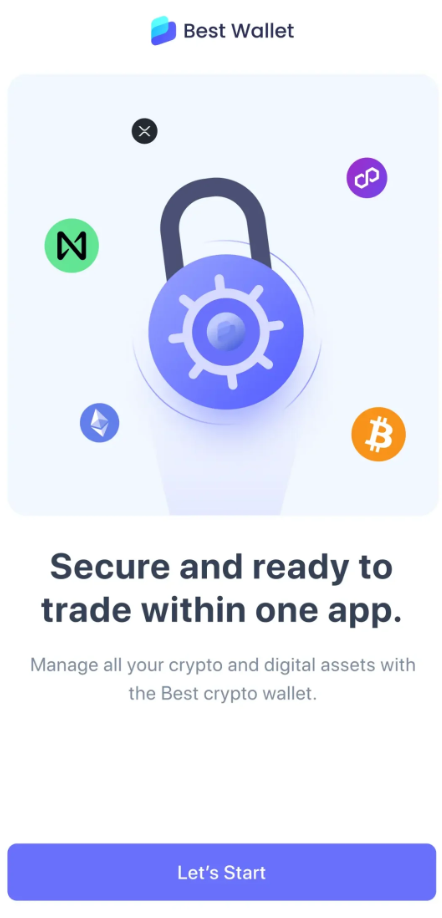
Staring Page of Best Wallet
Wallets that don’t use seed phrases are just as secure, and they offer easier ways to restore access to your wallet. For example, with Best Wallet, you just need access to your email and your PIN code to restore your wallet.
We recommend only using wallets that support multi-factor authentication. Biometric authentication is best because it’s considered by experts to be highly secure. If biometric authentication isn’t available, look for wallets that are compatible with an authenticator app rather than those that rely on SMS authentication.
You should also consider additional features like multi-signature support. This requires you to use multiple devices to sign off on transactions, making it more difficult for an attacker to steal your tokens.
Finally, make sure that the code underlying a decentralized Bitcoin wallet is fully secure. We recommend sticking to decentralized wallets that are open-source, like MetaMask, or that have undergone third-party security audits.
Supported Cryptocurrencies and Assets
Another important thing to consider when choosing a crypto wallet is what types of digital assets it can actually store. Some decentralized Bitcoin wallets onl y store Bitcoin, but most support a wide range of altcoins as well.
Generally, we recommend using a wallet that supports at least 50+ blockchains, including all of the largest ones. Some wallets don’t support chains like Ripple, which has a different architecture than most Ethereum Virtual Machine-compatible networks. Think carefully about what tokens you plan to use before choosing a wallet that has limited support.
It’s also worth thinking about whether you plan to buy and sell NFTs, since many decentralized wallets support these digital collectibles. Compatibility for different NFT standards varies widely among wallets.
Apps and User Experience
Nearly all major DeFi wallets offer mobile apps for iOS and Android, making it easy to check your token balances and deploy your cryptoassets on the go. Most also offer a web interface, and some offer browser extensions for Chrome and other major browsers. Desktop apps are less common, but can be a nice feature for crypto users who want to manage their portfolio from a computer.
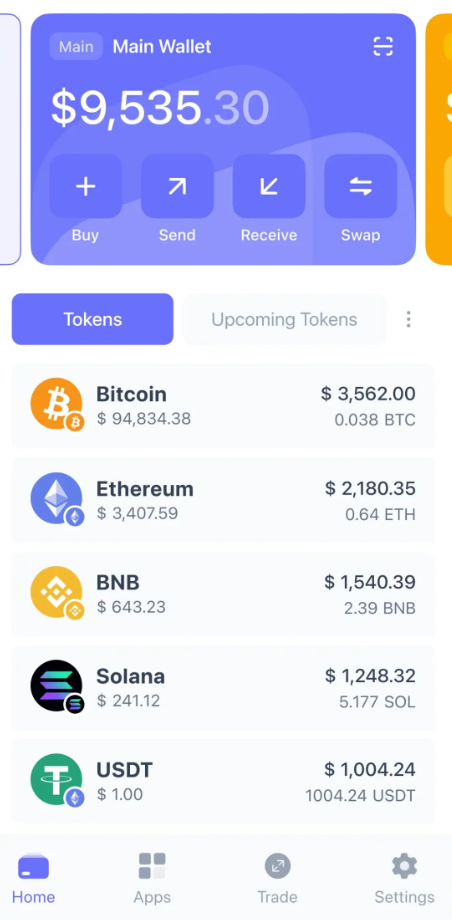
Main Wallet of Best Wallet
Be sure to explore the user experience when choosing a wallet. Most wallets are designed to be user-friendly, but some can feel clunky while others overwhelm the user with different options and features. Ideally, it should be extremely easy to monitor your token balances, buy, sell, or swap cryptocurrencies, and connect to popular dApps. More complex security settings should be available, but stored in an out-of-the-way menu for access only when you need.
Web3 Features
Innovative Web3 features can take a crypto wallet from good to great. At a minimum, decentralized wallets should make it easy to stake your tokens to earn interest and offer a dApp library where you can connect to popular DeFi and other platforms. An integrated NFT marketplace is also a plus.
Some wallets are starting to take Web3 integration much further. For example, Best Wallet has a built-in iGaming hub that lets users connect to popular crypto gambling sites with just a tap. It also has an integrated crypto launchpad, Upcoming Tokens, where users can easily invest in emerging crypto projects.
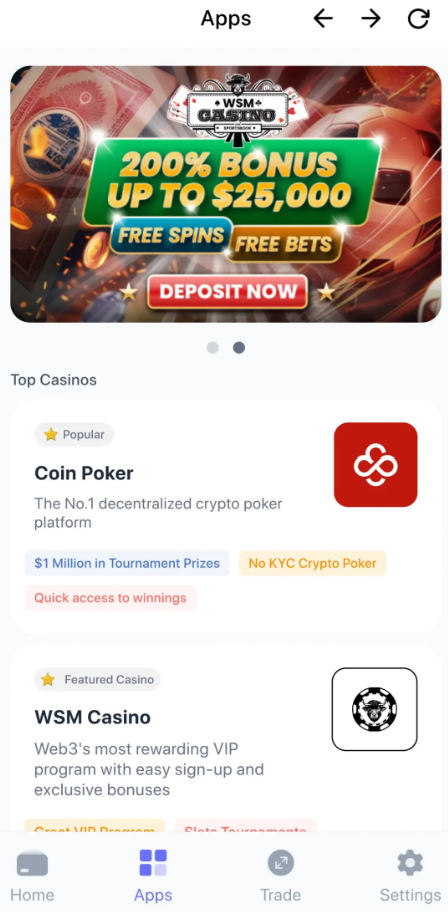
Ideally, wallets should vet the dApps they include in their libraries and offer some form of contract risk analysis. This significantly reduces the chances of connecting to a malicious dApp that could try to steal your tokens.
Swap Fees
A final thing to consider when choosing the best decentralized wallet app is how much the wallet’s built-in exchange charges to swap tokens. Fees can vary widely among different wallets, and they can add up quickly for active investors and crypto traders.
Be sure to also look for gas fee controls. Many wallets let you set maximum gas fees for your transactions, and some offer algorithms and alerts to help you minimize fees when trading cryptocurrencies.
Types of Decentralized Crypto Wallets
There are two main types of decentralized crypto wallets to be aware of: software wallets and hardware wallets.
Software wallets, also known as hot wallets, are solely pieces of software on your device that enable you to manage your cryptocurrencies. They are designed to be secure, but they’re always connected to the internet. This makes them potentially more vulnerable to attack, since someone with access to your wallet’s password could access your tokens at any time. (Multi-factor authentication is critical to ensure they also need physical access to your device.)
Hardware wallets, also known as cold wallets, use a combination of hardware and software to store your cryptocurrencies. Your tokens live on a physical device that is not connected to the internet. When you want to use your tokens for a transaction, the device can be connected (usually via USB or Bluetooth) to a mobile or desktop app, which in turn is connected to the internet.
The advantage of a hardware wallet is that it’s extremely secure. When your device isn’t connected to the internet, there’s no way for anyone to steal your tokens—even if they had everything needed to break into the partner app. In addition, when the device is connected to the partner app, you must press a button or tap a screen on the physical wallet device in order to approve any transactions.
The partner app can be used to buy, sell, and swap cryptocurrencies, as well as to stake tokens to earn interest. However, there may be more limited options for connecting to dApps than with a software wallet.
Not everyone uses hardware wallets because they have some additional drawbacks. First, it can be a hassle to connect your wallet every time you want to complete a transaction. In addition, hardware wallets cost money and may have limited storage capacity, whereas software wallets are free and have unlimited storage.
The solution many crypto investors adopt is to use both a software wallet and a hardware wallet in combination. The security of a hardware wallet is ideal for storing tokens that are long-term investments and don’t need to be swapped or traded frequently. The connectedness of a software wallet is ideal for tokens that might be transferred to a dApp or swapped in the near future. Just remember to keep your positions balanced across your wallets as they change over time.
How to Get a Decentralized Crypto Wallet
Ready to start using a decentralized wallet? We’ll walk through the steps for how you can download a wallet today and get started storing your crypto safely.
Step 1: Download a Wallet App
To get started, head to the website for the wallet you want to use. Download the wallet for your mobile device or browser.
Step 2: Create an Account
Open the wallet app and follow the prompts to create an account. Usually, you’ll need to provide an email address, username, and password.
Step 3: Write Down Your Seed Phrase
If your wallet provides a seed phrase, it’s important to write it down on a piece of paper and store it somewhere secure. You will need this seed phrase to restore your wallet on another device if you ever lose your device or your wallet password.
Step 4: Activate Multi-factor Authentication
Next, turn on multi-factor authentication. Different wallets offer different options, but fingerprint or facial recognition is best. Be sure to activate SMS authentication at a minimum.
Step 5: Buy, Sell, or Trade Crypto
Now your wallet is set up and you’re ready to start buying, selling, or trading cryptocurrency. If you already have crypto in another wallet, you can easily import your tokens to your new decentralized wallet.
Decentralized wallets offer a safe way to store your cryptocurrency and access the wide world of Web3. However, because of how central your wallet is to your crypto journey, it’s incredibly important to choose the right platform. We recommend Best Wallet as the overall best decentralized wallet for 2025, but we think you’ll have a great experience with any of the top eight wallets we highlighted.
Conclusion
Choosing the best decentralized crypto wallet is essential. While these wallets offer control and Web3 access, they also require you to take full responsibility for security. The risks are real — from phishing attacks to lost seed phrases — but they’re manageable with proper precautions.
Based on our testing, Best Wallet stands out as the top choice for 2025, combining advanced security without seed phrases, comprehensive Web3 features, and user-friendly design. For maximum security, consider pairing it with a hardware wallet like the Ledger Nano X for long-term storage.
References
- Customers who trusted crypto giant FTX may be left with nothing (CNN)
- What to Do If You Connect to a Malicious dApp: Step-by-step Guide (Tangem)
- How Biometric Authentication Enhances Security (Token)
- Atomic Wallet Hack (Cointelegraph)
- About Phantom Wallet (TradingView)
- Lost Bitcoins (Investopedia)
- Crypto Seed Phrase Hacks (Cointelegraph)
FAQ
What does decentralized mean in crypto?
Decentralized refers to any crypto-related software that is not owned by a centralized entity. It can refer to decentralized wallets, which are owned by individuals who manage their own private keys. It can also refer to smart contracts, which run autonomously on a blockchain without requiring a centralized entity to manage them.
Are decentralized crypto wallets better?
Decentralized crypto wallets offer a number of advantages over centralized crypto wallets, the most important of which is full control over your tokens. No one can block your transactions or take tokens from your wallet without your permission. However, with a decentralized wallet, you are fully responsible for keeping your wallet secure, so there is some additional work and knowledge required.
What is the best decentralized crypto wallet?
Based on our testing, the best decentralized crypto wallet is Best Wallet. It supports more than 60 blockchains and offers multi-layered security options, plus has tons of Web3 features to help you get the most out of your cryptocurrency. We especially like Best Wallet’s Upcoming Tokens crypto launchpad, which lets you easily discover and invest in hot new crypto projects.
Are decentralized wallets secure?
Decentralized crypto wallets can be fully secure, but it’s up to you to keep your wallet safe. Only use trusted wallets that are open-source or have undergone security audits. In addition, you must keep your wallet’s seed phrase safe and activate multi-factor authentication to keep your decentralized wallet fully secure.
Is Binance a decentralized wallet?
Binance is a centralized crypto exchange that also offers a decentralized crypto wallet called Binance Wallet. Binance Wallet gives users full self-custody over their tokens, but it can be linked with a centralized Binance account to make buying and trading cryptocurrencies easier.
Is Coinbase a decentralized wallet?
Coinbase Wallet is a decentralized wallet. However, Coinbase the crypto exchange is centralized, and tokens held in a Coinbase account are held in centralized (also called custodial) wallets. You can link Coinbase Wallet to Coinbase to enjoy the benefits of a decentralized wallet while still using the centralized exchange to trade.
Is Trust a decentralized wallet?
Yes, Trust Wallet is a fully decentralized crypto wallet, also known as a self-custody or non-custodial wallet. It supports tokens and NFTs from more than 100 blockchains and offers a dApp library so users can take full advantage of Web3.
Is MetaMask a decentralized wallet?
Yes, MetaMask is a decentralized crypto wallet. It is one of the most popular decentralized wallet apps and supports all Ethereum-based tokens as well as tokens on BNB Smart Chain, Polygon, and Avalanche.
Tron (TRX) price forecast for 2025–2030 with insights on token utility, growth drivers, market trends, and long-term investment ou...
This guide explains how to buy TOKEN6900, a new meme coin project with an attractive market capitalization. Learn how to join the ...